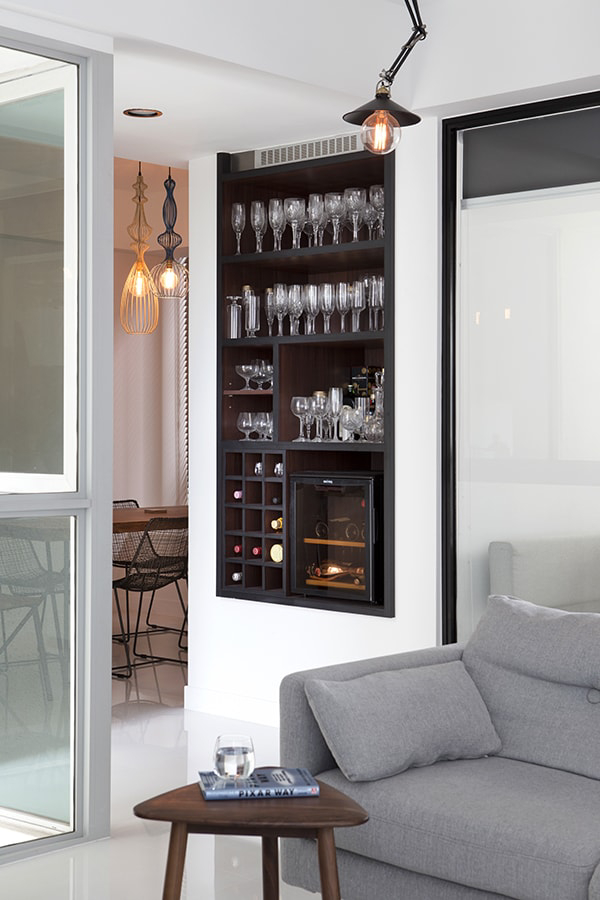Ask the experts: How best to store wine at home

As a connoisseur of wine, you might be able to discern good wine from the mediocre, but do you know how to store your wine bottles in order to keep them at their best? We don't either.
So to help you along, we roped in the experts at Wala Club, which offers monthly wine and sake subscriptions in Singapore, to shine some light on wine storage at home.
The ideal temperature is between 8 to 18 degrees Celsius, although this temperature range depends on your wine.
If you have white or sparkling wine, they can be stored at a lower temperature of 8 to 12 degrees Celsius. For red wine, they can be stored at a higher temperature between 12 to 18 degrees Celsius.
For long-term storage, don't store your wine bottles in areas that are more than 24 degrees Celsius, as this will cause your wine to oxidise, affecting the quality of it.

How you store your wine bottles depends on the closure.
For bottles with corks, it's best to tilt them at an angle or place them horizontally to keep the corks moist, essential to prevent your wine from oxidising and turning bad.
Keeping the bottles at an angle also helps to keep the deposits and sediments at the bottom of the bottle. On the other hand, screw top bottles can be kept upright.

UV rays from direct sunlight can affect the flavours and aromas of your wine, so do keep the bottles away from daylight exposure.
You should also avoid exposing your bottles to the light given off from light bulbs.
While the damage isn't as much as exposing them to direct sunlight, the quality of your wine will still be affected. Best to keep your bottles in dark areas and free from light in general.
The ideal humidity level to store wine is between 60 to 80 per cent. Get a hygrometer to assess the humidity level of your wine storage area.
In Singapore, with humidity levels more or less within this range, this is less of an issue. But best to check just to make sure.
Too low a humidity level and it can lead to drying out the cork, which causes it to shrink, letting air into the bottle and damaging your wine. Too high humidity level and it can cause damage to your wine labels.

Keep your wine bottles away from areas with a lot of vibration, traffic and movement.
This will disturb the sediments in the wine bottle, which are usually collected at the bottom of the bottle, mixing them up with the rest of the wine. Vibration can also lead to chemical changes in your wine, disrupting the ageing process.
Areas to avoid include the service yard where your washing machine is, home entertainment rooms with vibrating speakers and sound systems as well as exercise areas or your home gym.

A wine chiller is the best way to store your wine bottles, since temperature, humidity, lighting and vibration can be controlled.
Some wine chillers also come with options like air filters, which help to keep contaminants outs, helping to preserve the quality and taste of your wines.
For small apartments, there are wine chillers in smaller sizes that hold around 12 to 24 bottles so they won't take up too much space in the home.
That said, a wine chiller is only a must if you want to keep your bottles for the long term. If you are going to consume your wines within days or a couple of weeks, store them anywhere in the home that is away from direct light and vibration.
A good place is a relatively vacant bomb shelter.
A refrigerator is a good alternative only if your wines are for short-term storage.
This is because it has a motor that is running constantly, which will cause vibrations that will affect the quality of your wine.
Other foods stored in the refrigerator can also produce odours which will contaminate the flavours of your wine.
Stored correctly in a wine chiller, opened wine bottles can last 3 to 5 days and up to a week without the quality of wine degrading too much.
The key to retaining the quality, taste and aroma of an opened wine bottle is to re-cork it promptly and tightly.
If the cork is damaged, use a rubber wine stopper to create a tight seal or a wine vacuum pump that will help you to remove the air out of an opened bottle to create a near airtight and vacuumed bottle.
This article was first published in Renonation.